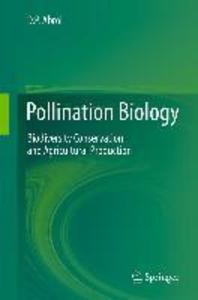This book has a wider approach not strictly focused on crop production compared to other books that are strictly oriented towards bees, but has a generalist approach to pollination biology. It also highlights relationships between introduced and wild pollinators and consequences of such introductions on communities of wild pollinating insects. The chapters on biochemical basis of plant-pollination interaction, pollination energetics, climate change and pollinators and pollinators as bioindicators of ecosystem functioning provide a base for future insights into pollination biology. The role of honeybees and wild bees on crop pollination, value of bee pollination, planned honeybee pollination, non-bee pollinators, safety of pollinators, pollination in cages, pollination for hybrid seed production, the problem of diseases, genetically modified plants and bees, the role of bees in improving food security and livelihoods, capacity building and awareness for pollinators are also discussed.
Inhaltsverzeichnis
1. Introduction. - 2. Historical perspective. - 3. Pollination-basic concepts. - 4. Applied pollination- present scenario. - 5. Honeybees and crop pollination. - 6. Wild bees and crop pollination. - 7. Value of bee pollination. - 8. Planned honeybee pollination for crop production. - 9. Non bee pollinators- plant interaction. - 10. Safety of pollinators. - 11. Pollination in cages. - 12. Pollination for hybrid seed production. - 13. Biochemical basis of plant- pollination interaction. - 14. Pollination energetic. - 15. Climate change and pollinators. - 16. Pollinators as bioindicators of ecosystem functioning. - 17. Decline in Pollinators. - 18. The Problem of Diseases in Bees. - 19. Consequences of introduced honeybees upon native bee communities. - 20. Genetically modified plants and bees. - 21. Conservation of pollinators for crop plants and wildlife. - 22. The role of pollination in improving food security and livelihoods. - 23. Capacity building and awareness for pollinators.












